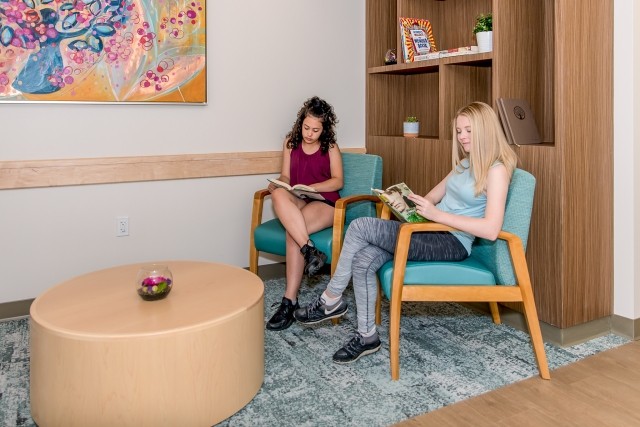Helping Your Child Build Skills to Support Learning
Eating Recovery Center and Pathlight Mood & Anxiety Center (ERC Pathlight) is committed to helping our young patients progress in school while getting the eating disorder and mental health support they need. Our on-site treatment programs include dedicated time (up to three hours per day) Monday through Friday in a classroom setting to complete all school assignments. Our virtual programs are timed around traditional school hours to ensure your child can receive treatment while continuing their usual schooling.
In addition to receiving support from our education specialists, your child's care team will help them understand their learning style and needs, building the awareness and skills necessary to thrive in future academic settings. Primary therapists are also available to assist your child as needed during dedicated education hours at our centers.

Establishing a Structure for Schoolwork
Our adolescent programs were created with your child’s education needs in mind.
- Our inpatient, residential and partial hospitalization programs have been created with time built into programming to complete all necessary school assignments.
- Students will have one to three hours of class time allotted, Monday through Friday, in our classrooms.
- Education specialists are present during classroom hours to help your child.
Establishing a Structure for Schoolwork
Once your child begins programming, one of our dedicated education specialists will take on all coordination necessary to ensure your child has what they need to complete coursework and smoothly transition back to school when treatment is completed.
- Your child’s education specialist will send an admission packet to their school. The admission packet includes an introduction letter, an estimated length of stay and a letter asking for a reduced/prioritized list of homework assignments.
- They will then work directly with your child’s school to explain ERC Pathlight’s structure, including the time allowed for academia while in programming and the general structure of academic time.
Academic Monitoring
Academic time is supervised by your child’s education specialist, who will review assignments and answer any questions. Then, your child will complete their schoolwork independently. If your child needs help, the teacher will offer one-on-one assistance. The teacher will take notes and document your child’s daily progress.
Tips for Parents & Caregivers
You may find yourself asking the familiar questions: What do I need to do to prepare my child for admission? Do I need to coordinate with their school? What do they need to bring.?
First, we’d like to assure you that our team is here to support you and your child. Our facilities are equipped with basic supplies your child may need to complete their schoolwork, such as paper, pencils/pens, basic calculators, etc. Most of our centers are also able to provide a laptop and earbuds for use as needed if a student does not have their own. If you have time to prepare, there are a few things that can be helpful to gather ahead of admission; if not, that’s OK too. We are here for you!
-
Tip 1: Gather School Supplies
Have the following supplies to make learning and completing assignments easier for your child while they are in our program: all textbooks, required reading, any special programs/tools required (Adobe, graphic calculators, poster boards, graphing paper, etc.).
-
Tip 2: Bring School-Issued Technology and Accessories
Bring a school-issued laptop along with the appropriate charging cable to complete assignments. Please also pack your child’s preferred headphones and charging cable.
Important note: We ask that you also have your child write down their username and password to ensure they can log in to their device to complete assignments. This will include any usernames and passwords required to access websites or programs required to complete coursework.
-
Tip 3: Bring Existing 504/IEP Documentation
If your child has an existing 504 or IEP plan, please bring it with you on the first day to share with our team.
-
Tip 4: Collect Existing Assignments
If your child has any existing paper assignments or a schedule for assignments, please bring these with you for admission. This can include worksheets that need to be completed and physically turned in.
-
Tip 5: Establish a Point of Contact
Upon admission, our education specialist will ask for a point of contact at your child’s school. Please have a name and contact information prepared to share. This could be a school counselor, principal or other administrator. When establishing a point of contact for your child’s school, you may be able to ask if their school has an online learning platform. If they do, please let our team know upon admission.
School Accommodations for Mental Health Disorders
There are different laws in place to help support your child on their path to an education. A common one you may hear about is IDEA (Individuals with Disabilities Education Act), which ensures kids and teens with disabilities have access to public education and related services. Accommodations under this law include: 504 plan. It can be helpful to think of a 504 plan as a guide for your child’s school to ensure they are doing all they can to support your child’s learning. IEP (individualized education plan). This is an individualized plan for your specific child to outline what they need to successfully obtain an education. IDEA is an overarching law that ensures children with disabilities are provided additional resources in school. NOTE: Under federal law, children with chronic or life-threatening illnesses and/or disabilities are entitled to educational support and accommodations. Eating disorders and psychiatric illnesses fall under IDEA.
Additional Accommodations to Consider Adding to a 504 Plan or IEP
- Consider attendance in treatment equivalent to school attendance. (ERC Pathlight can provide proof of treatment attendance, if needed.)
- Apply no penalties for failure to log on to a virtual class meeting or failure to complete assignments related to information shared in virtual class meetings.
- Reduce assignments to those essential for course credit.
- Limit repetitive assignments.
- Accept partially completed assignments if the student has satisfactorily exhibited mastery of the concept.
- Provide due date extensions as requested.
- Provide alternative assignments as requested.
To learn more about each of these plans, please reference the websites below and/or contact your local school administrator for additional support.
What is an IEP?
The difference between IEPs and 504 plans
What is the Individuals with Disabilities Education Act (IDEA)?
FAQ
-
Is school time built into my child’s program schedule?
Yes. Our residential, inpatient and partial hospitalization programs include one to three hours of dedicated school time in a classroom setting Monday through Friday.
-
Will my child stay enrolled at their current school at home?In most cases, yes. Our goal is for students to stay enrolled and complete assignments provided directly by their current school. If this is not possible, we will help your family find another solution so your child’s credits will transfer when they return home.
-
Who will oversee my child’s school assignments and academic progress?
An education specialist works with kids and teens in our inpatient, residential and partial hospitalization programs. These specialists are trained to:
- Partner with your child’s school to make sure assignments are reasonably achievable during the academic hours provided
- Serve as an academic liaison with parents, school contacts (teachers, guidance counselors, administrators) and others
- Review all school assignments with your child
- Empower students to complete schoolwork independently, providing additional support when needed
- Ensure a smooth transition back to school when your child returns home by sending education transition plans and recommendations directly to their school
Students in Eating Recovery At Home and Pathlight At Home, our virtual intensive outpatient programs for eating disorders and mood and anxiety disorders, stay connected to school by accessing virtual care outside of their regular school hours.
For college students, most campuses offer flexibility when seeking mental health care. We provide any documentation needed and help advocate on your behalf.
-
Will my child lose academic progress?
It is not uncommon for children and adolescents to experience academic decline due to eating disorder or mood, anxiety or trauma-related symptoms. Many parents and caregivers worry that by taking time away from school academic decline will only worsen. We understand your concerns. We want to reassure you that while your child is receiving care, they will see symptom improvement in areas that have typically caused academic decline such as fatigue, difficulty concentrating and lack of motivation. Lessening these symptoms will provide an opportunity for improved academic achievement.
Many parents also worry about academic anxiety worsening with school absences or depression worsening with distance and isolation from school peers and activities. For many children, the benefits of attending programming and receiving care outweigh the potential risks of taking time away from school. Our providers will address increased anxiety or depression surrounding academics and help your child develop life-long coping skills that will help them navigate uncertain and stressful times.
We Are Here to Help
Our education specialists are here to help you and your child navigate their education needs from the time of admission and beyond. They are able to provide as much or as little support as you’d like to ensure your child has a smooth transition back to school when that time comes.
We encourage you to reach out to our admissions team with any additional questions you may have as you make the decision to seek a higher level of care for your child.

Hide Last Child Layout Div

